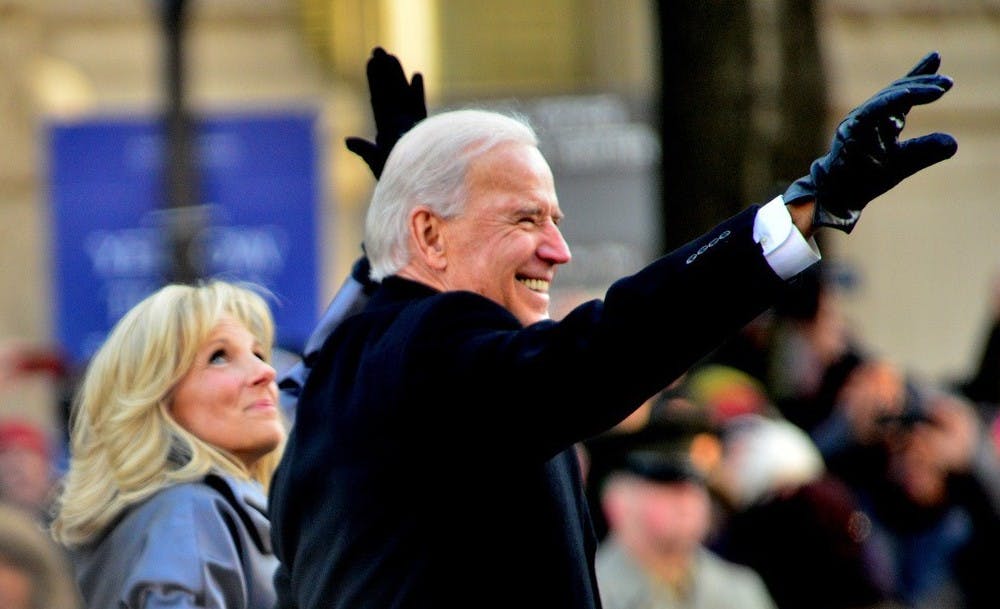The recent presidential transition is putting President Joe Biden’s priorities in the spotlight. He has already reversed some of the previous administration’s homophobic, environmentally destructive and transphobic policies. However, this new executive office needs to take a firm stance to defend the separation of church and state. Donald Trump consistently breached that separation — as such, it is Biden’s job to reaffirm that preferential treatment of religious groups is unconstitutional and dividing our country.
The Constitution’s Establishment Clause bars the country from establishing an official religion and favoring certain religions over others or over nonreligion. However, a stricter interpretation is required, as instances of religious preferential treatment can be seen in national laws, policies and official government settings. The illegal integration of religion — in what should be entirely secular matters — sows division in an already fractured country. Reaffirming allegiance to what is typically white Christianity among matters that preside over the entire nation does not comfort believers of other faiths and non-believers. When the government shows favoritism for particular religions, they stifle the freedom of others. Thus, a secular nation is a better guarantor of religious freedom and liberty.
The United States has consistently been partial toward religious ideals, organizations and influences. For example, churches and religious organizations are exempt from submitting annual informational returns to the IRS. A recent example of preferential treatment for religious entities is exemption from social distancing requirements. Across the U.S. and even at the University, people are risking lives to attend large religious gatherings. The favorable treatment of the religious is everywhere in law — giving specialized, taxpayer funded bailouts to churches during the pandemic and allowing clerical abusers to remain free from the justice system for decades, for example.
This preferential treatment is not just a de jure issue — it is de facto as well. Those without religion are less trusted by the general public. The government could combat these prejudices with less affirmation of Christianity in official settings. Every time the Christian Chaplain opens a congressional session or a state government erects a Ten Commandments statue, non-believers and religious minorities are pushed to the side and seen as others in society. These unnecessary promotions of religion and Christianity fuel bigotry and establish a Christian supremacy that alienates and divides.
There is no problem with lawmakers expressing their religion privately, of course, but expressing it in their official capacities through preferential laws and treatment is dangerous for our nation. Instead, the political advantages of pandering to religion — particularly Christianity — seem to outweigh regard for the law. Joe Biden, “in [his] first act as President” called for a national prayer. He made countless references to a nation “under God” during his inaugural speech. His words inevitably rankled those who believe in no God, believe in multiple gods or just desire a secular administration. Biden should have been conscious that imposing monotheistic religion in what should have been a unifying speech was divisive and unnecessary. References to Christian influence exist everywhere in official functions — whether it be currency, the Pledge of Allegiance or our country’s official motto. Thus, we do not need more reminders that our government has historically featured little tolerance for separation of church and state.
While this is a national issue, the University also has its own issues of religious partiality. Thomas Jefferson, founder of the University and author of the Virginia Statute of Religious Freedom, coined the term “separation between Church and State.” Pretending that this country is by and for Christians is ignoring our founding principles. Jefferson’s ideals conflict with the COVID-friendly Church gatherings in Ern Commons and Christian clubs’ discrimination against members of the LGBTQ+ community. The deterioration of the separation of church and state is an injustice that must be addressed by University officials and government officials alike. The University’s Student Council has already passed measures against discrimination from religious clubs on Grounds. However, University officials should immediately cease unconstitutional and harmful religious exemptions, such as the public funding of discriminatory organizations who violate the Contracted Independent Organization agreement and exemptions to the six-person gathering limit during the pandemic.
Some might argue that religion is very personal to certain officials and asking them to put aside their personal beliefs in public matters is wrong. However, governmental matters should have the sole purpose of serving the people. Officials need to be cognizant of not letting their biases and personal agendas overshadow their work because they have a duty to serve the American public, who represent hundreds of religions. Those elected to a secular, federal job are given the opportunity to lead the people — not themselves.
Nicole Chebili is an Opinion Columnist for The Cavalier Daily. She can be reached at opinion@cavalierdaily.com.
The opinions expressed in this column are not necessarily those of The Cavalier Daily. Columns represent the views of the authors alone.







